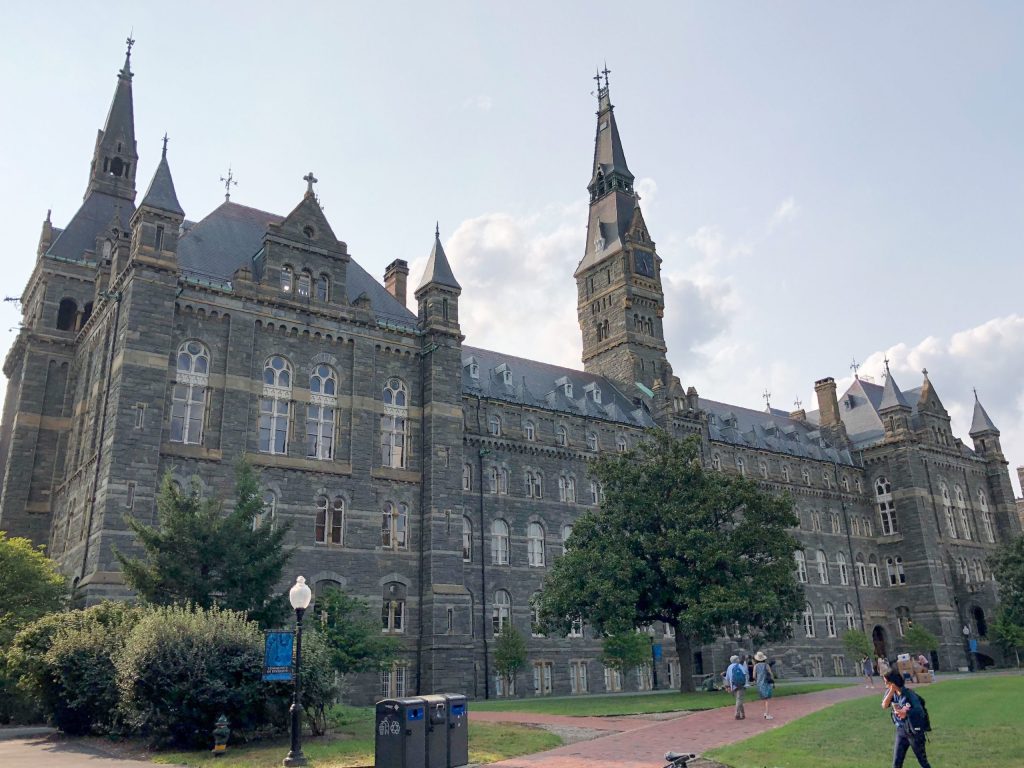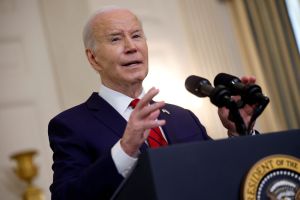The New York Times’s opinion editor resigned in disgrace earlier this month following a newsroom revolt over the publication of an op-ed by Sen. Tom Cotton. The op-ed ‘put black New York Times staffers in danger’, the newspaper’s reporters lamented in nearly identical tweets, because it called for using the National Guard to put down the riots in nearly every major American city. The incident perfectly framed what happens when weak-minded college students who are seldom exposed to opposing or controversial viewpoints graduate into the nation’s top newsrooms. The campuses themselves aren’t faring much better.
Members of Generation Z are thought to be more culturally conservative than their millennial counterparts, but Georgetown students must have missed the memo. Georgetown University’s student-run Lecture Fund, an organization that coordinates speaker events on campus, announced on its Instagram account Monday that it will be dedicating 50 percent of its yearly allocation to ‘amplify Black voices’. It’s unclear how exactly the group arrived at this decision, considering black people comprise just 12 percent of the US population. The Lecture Fund’s statement that it is ‘tasked with serious introspection’ suggests the students are alleviating some type of guilt with a bizarre form of reparations. Indeed, the group notes that it doesn’t have many black students trying to join its board, which it conveniently blames on its own recruitment efforts rather than a pure lack of interest. In order to pay back this perceived debt to black students, the Lecture Fund will put over $40,000 of its funding towards securing black speakers. It is worth noting that the bulk of Lecture Fund’s money is allocated through the school’s Student Activities Fee, a mandatory semesterly fee paid by students. There is no truer form of activism than putting someone else’s money where your mouth is.
These students may just be well-intentioned kids suffering from white guilt, but the rest of their announcement reveals a dystopian and manipulated view of free speech that would make Orwell blush. Free speech, it says, ‘is neither free nor fair in its impacts on Black lives in this country and on our campus’. No free speech defender would argue that objectionable speech comes without costs. But most have determined that the alternative — suppressing speech — has a far greater downside.
Jonathan Rauch, a senior fellow at the Brookings Institution, wrote the following in the Washington Post in 2014:
‘Painful though hate speech may be for individual members of minorities or other targeted groups, its toleration is to their great collective benefit, because in a climate of free intellectual exchange hateful and bigoted ideas are refuted and discredited, not merely suppressed… That is how we gay folks achieved the stunning gains we’ve made in America: by arguing toward truth.’
The Lecture Fund views objectionable speech as more than just ‘painful’, though. According to the Toni Morrison quote the organization chose to accompany its announcement, it believes that such speech is ‘violence’. When the group says it will ‘prioritize the wellbeing of Black students in the process of inviting speakers to campus,’ what it really means is that it will give students veto power over any speakers they say will literally cause them harm. In practice, this likely means any speakers to the right of Jennifer Rubin will be barred from invitations.
Lecture Fund, which claims to be non-partisan, already has a demonstrated bias toward left-wing speakers. An analysis by the Georgetown Review between 2013 and 2017 found that 71 percent of the political speakers brought to campus by the Lecture Fund were ‘liberal’ or ‘left-leaning’, while just 18 percent were ‘conservative’ or ‘right-leaning’. The Georgetown student body, meanwhile, has often compared right-leaning speech to violence and protested when prominent conservatives or classical liberals are invited to speak. When I was a junior at Georgetown, I was reported to the administration for coordinating an event with feminist scholar Dr Christina Hoff Sommers, who some students deemed a ‘rape apologist’. I was ‘making students feel unsafe’, the complaint went, because Dr Sommers supports due process for men accused of sexual assault on campus. (Sommers endorsed Andrew Yang in the 2020 Democratic primaries.)
More recently, multiple student groups called for boycotting the appearance of Charlie Kirk and Eric Trump on campus because they have ‘actively encouraged’ ‘dangerous and bigoted behaviors’ — no examples provided, of course.
The most ghoulish part of the Lecture Fund’s announcement is found, again, in the chosen Toni Morrison quote: ‘Sexist language, racist language, theistic language — all are typical of the policing languages of mastery, and cannot, do not permit new knowledge or the mutual exchange of ideas.’
Wait a second — theistic language is problematic now? I’m afraid this viewpoint would likely require the defunding and dismantling of the university itself, considering Georgetown is the oldest Catholic and Jesuit institution of higher learning in the country. The idea that theistic language is inherently oppressive is also not consistent with history. While Christianity’s relationship to slavery is complicated, many Christian denominations, most notably the Quakers, were an integral part of the abolitionist movement in the United States. Georgetown has described its own sale of 272 slaves in 1838 as inconsistent with the Church’s teachings and it was at odds with the attitude of the Jesuits of Rome at the time (Pope Pius VII had called for the suppression of the slave trade two decades earlier).
[special_offer]
This wouldn’t be the first time that Lecture Fund has scoffed in the face of Georgetown’s religiosity. In 2016, my senior year at the university, the Lecture Fund invited then-Planned Parenthood president Cecile Richards to speak. Despite Georgetown’s opposition to abortion, this might have been acceptable given the university’s commitment to freedom of expression. But Lecture Fund went beyond just giving Richards a platform. The leaders of the club turned the event into a de facto abortion rally, barring media from the event, hugging Richards when she appeared on stage, and limiting the amount of questions that pro-life students could ask during a Q&A session. The ‘non-partisan’ lecture fund declared during the event that ‘God is pro-choice’ and asked students to give a round of applause for abortion providers.
The GU Lecture Fund is welcome to pay its own form of reparations, restrict free speech, and advance left-wing causes, but it shouldn’t be using student money to do so while posturing as a ‘non-partisan’ organization that ‘exists to enrich the academic experience of the Georgetown community.’ The students who currently run the organization have proven with their latest social media pledge that they are merely leftist activists playing pretend at creating diverse and open dialogue.
If this is the way students are thinking and behaving at our institutions of higher learning, the internal revolts at places like the New York Times will become the rule rather than the exception. Our so-called elite institutions better be careful who they hire.


















